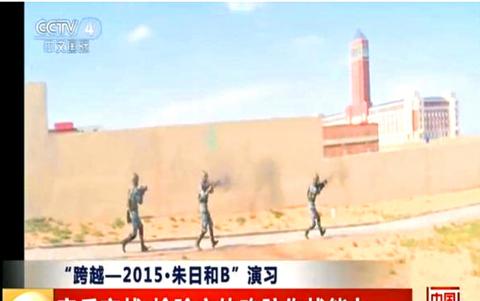The appearance of structures similar to the Presidential Office Building in China’s recent war games sparked Internet debate over whether the footage was a targeted provocation against Taiwan and a demonstration of China’s willingness to resort to military force to unify Taiwan with China.
In the most recent Military Report show aired by Chinese state-media China Central Television (CCTV) on July 5, exercises at the Zhurihe Training Base in the Inner Mongolia Autonomous Region successfully simulated a “decapitation” strategy and demonstrated high efficiency in intelligence gathering where unmanned aerial vehicles (UAV), helicopters and recon teams sent back hundreds of photographs to command.
The three-minute video clip featured special forces personnel sprinting into a five-story building with a tower in one of the Stride 2015 Zhurihe series of exercises by the People’s Liberation Army (PLA).

Photo: CNA screen grab from CCTV
The footage showing Chinese troops maneuvering toward a building resembling the Presidential Office Building was not the first time Chinese forces have simulated an attack on Taiwan in military exercises.
The PLA reportedly built a replica of Taichung’s shared-use Cingcyuangang Air Field in China’s Gansu Province to simulate attacks on the airfield. The PLA Army, PLA Air Force and special forces also reportedly established a special forces team in the Nanjing military zone that was fluent in Hoklo (commonly known as Taiwanese) earlier this year.
Ministry of National Defense spokesman Major General David Lo (羅紹和) yesterday said that the implied target of the military exercise was detrimental to cross-strait relations and was not an action either the Taiwanese or the international community could accept.
The ministry is up to date on all PLA exercises and while adhering to President Ma Ying-jeou’s (馬英九) instructions of “three defensive lines” and not embarking on an arms race with China, the military maintains a force that would effectively deter Taiwan’s enemies and capably defend the nation, Lo said.
The three defensive lines refers to Ma’s previous statements, with the first being institutionalized relations with China; the other two the country’s soft power and international support for Taiwan.
Additional reporting by CNA

A Ministry of Foreign Affairs official yesterday said that a delegation that visited China for an APEC meeting did not receive any kind of treatment that downgraded Taiwan’s sovereignty. Department of International Organizations Director-General Jonathan Sun (孫儉元) said that he and a group of ministry officials visited Shenzhen, China, to attend the APEC Informal Senior Officials’ Meeting last month. The trip went “smoothly and safely” for all Taiwanese delegates, as the Chinese side arranged the trip in accordance with long-standing practices, Sun said at the ministry’s weekly briefing. The Taiwanese group did not encounter any political suppression, he said. Sun made the remarks when

The Taiwanese passport ranked 33rd in a global listing of passports by convenience this month, rising three places from last month’s ranking, but matching its position in January last year. The Henley Passport Index, an international ranking of passports by the number of designations its holder can travel to without a visa, showed that the Taiwan passport enables holders to travel to 139 countries and territories without a visa. Singapore’s passport was ranked the most powerful with visa-free access to 192 destinations out of 227, according to the index published on Tuesday by UK-based migration investment consultancy firm Henley and Partners. Japan’s and

BROAD AGREEMENT: The two are nearing a trade deal to reduce Taiwan’s tariff to 15% and a commitment for TSMC to build five more fabs, a ‘New York Times’ report said Taiwan and the US have reached a broad consensus on a trade deal, the Executive Yuan’s Office of Trade Negotiations said yesterday, after a report said that Washington is set to reduce Taiwan’s tariff rate to 15 percent. The New York Times on Monday reported that the two nations are nearing a trade deal to reduce Taiwan’s tariff rate to 15 percent and commit Taiwan Semiconductor Manufacturing Co (TSMC, 台積電) to building at least five more facilities in the US. “The agreement, which has been under negotiation for months, is being legally scrubbed and could be announced this month,” the paper said,

MIXED SOURCING: While Taiwan is expanding domestic production, it also sources munitions overseas, as some, like M855 rounds, are cheaper than locally made ones Taiwan and the US plan to jointly produce 155mm artillery shells, as the munition is in high demand due to the Ukraine-Russia war and should be useful in Taiwan’s self-defense, Armaments Bureau Director-General Lieutenant General Lin Wen-hsiang (林文祥) told lawmakers in Taipei yesterday. Lin was responding to questions about Taiwan’s partnership with allies in producing munitions at a meeting of the legislature’s Foreign Affairs and National Defense Committee. Given the intense demand for 155mm artillery shells in Ukraine’s defense against the Russian invasion, and in light of Taiwan’s own defensive needs, Taipei and Washington plan to jointly produce 155mm shells, said Lin,